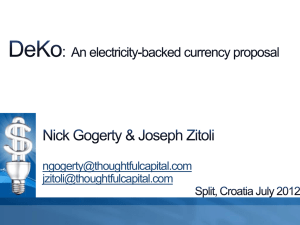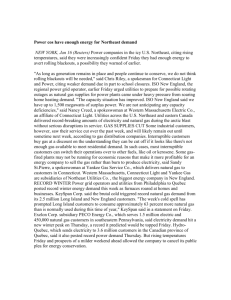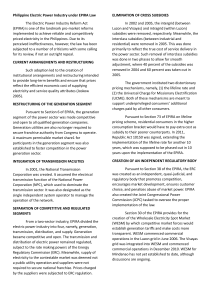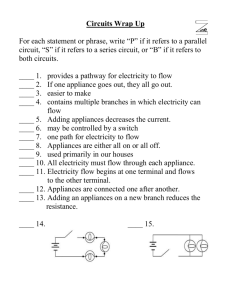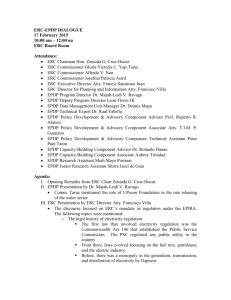Bill No. 3847("An Act to Protect the Rights and Promote the Welfare
advertisement
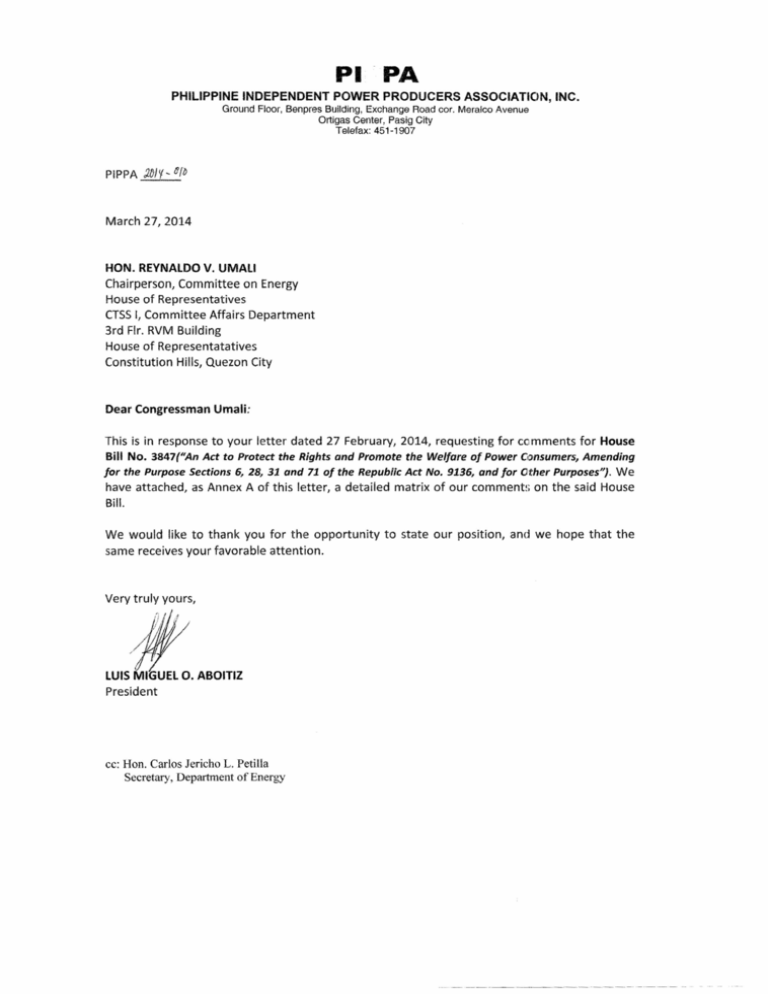
PI-PA PHILIPPINE INDEPENDENT POWER PRODUCERS ASSOCIATION, INC. Ground Floor, Benpres Building, Exchange Road cor. Meralco Avenue Ortigas Center, Pasig City Telefax: 451-1907 March 27, 2014 HON. REYNALDO V. UMALI Chairperson, Committee on Energy House of Representatives CTSSI, Committee Affairs Department 3rd Fir. RVM Building House of Representatatives Constitution Hills, Quezon City Dear Congressman Umali: This is in response to your letter dated 27 February, 2014, requesting for comments for House Bill No. 3847("An Act to Protect the Rights and Promote the Welfare of Power Consumers, Amending for the Purpose Sections 6, 28, 31 and 71 of the Republic Act No. 9136, and for Other Purposes"). We have attached, as Annex A of this letter, a detailed matrix of our comments on the said House Bill. We would like to thank you for the opportunity same receives your favorable attention. Very truly yours, if/ };j/[ LUIS'MIGUn O. ABOITIZ President cc: Hon. Carlos Jericho L. Petilla Secretary, Department of Energy to state our position, and we hope that the PIPPA COMMENTS TO HOUSE BILLS March 26, 2014 Comment Section/Provision HOUSE BILL NO. 3847("An Act to Protect the Rights and Promote the Welfare of Power Consumers, Amending for the Purpose Sections 6, 28, 31 and 71 of the Republic Act No. 9136, and for Other Purposes") "Section 6.Generation competitive and open. Sector- Generation of electric power shall be Upon the effectivity of this Act, any new generation company shall, before it operates, secure from the Energy Regulatory Commission a certificate of compliance pursuant to the standards set forth in this Act, as well as health, safety and environmental clearances from the appropriate government agencies under existing iaws. I The PIPPA has always manifested that the generation sector is already subjected to special regulations under EPIRA, even without a franchise. In the current Section 6 of the EPIRA states that: "SEC.6. Generation Sector. - Generation of electric power, a business affected with public interest, shall be competitive and open. Upon the effectivity of this Act, any new generation company shall, before it " ...Any law to the contrary notwithstanding, powergeneration SHALL BE operates, secure from the Energy Regulatory Commission (ERC) a certificate of considered a public utility WHOSE operation SHALL BE SUBJECTTO THE compliance pursuant to the standards set forth in this Act, as well as health, safety and environmental clearances from the appropriate government agencies PROVISIONS OF THE PUBLIC SERVICEACT (Commonwealth Act No. 146)" under existing laws .... 11 " ... EVEN UNDER A REGIME OF RETAIL COMPETITION AND OPEN ACCESS, THE EXISTENCEOF WHICH SHALL BE DETERMINED BY THE DEPARTMENT OF ENERGY (DOE) AND THE ENERGY REGULATION COMMISSION (ERe) AND CONCURRED TO BY THE CONGRESSIONAL POWER COMMISSION. THE PRICESCHARGED BY A GENERATION COMPANY FOR THE SUPPLY OF ELECTRICITYSHALL REMAIN THE SUBJECTOF REGULATION UNDER SUCH Section 6 clearly defines that the generation sector is not an ordinary business, as it is a business affected with public interest. Thus, it would have to secure from the Energy Regulatory Commission (ERe) a certificate of compliance (COe), as well as other requirements. In securing a COC, the generation company shall comply with ERC rules and regulation necessary for the 1 Section/Provision TERMS AND CONDITIONS AS MAY BE PROMULGATED BY THE ERe..." 11 Comment generation sector.Thus, the generation sector, although without franchise, may be considered as subject to special regulations. a national IJ " ...The ERC shall, in determining the existence of market power abuse or anti-competitive behavior, require from generation companies the submission of their financial statements, OPERATIONAL PLANS AND SUCH OTHER NECESSARYDOCUMENTS TO MAKE SUCH DETERMINATION IN AS FACTUAL AND PROPERA MANNER AS POSSIBLE..." On the other hand. a public utility is defined as: "a business or service engaged in regularly supplying the public with some ~ commodity or service of public consequence such as electricity, gas, water, transportation, telephone or telegraph service" For electricity, transmission and distribution sectors are considered public utilities since they are natural monopolies. Distribution utilities deal with the public directly. Moreover, they have captive customers, which include the household sector. By captive, it means that the customers cannot choose any other distribution utility. Thus, the transmission and distribution utilities should have their rates reviewed and approved by the ERe. These rates also produce guaranteed profits. If power generation is regulated then it will have to choose one of multiple developers who want to build at least four years ahead of energy delivery. Developers and their lenders will want to know the regulated rate before they start construction of the plant. Even though the EPIRA acknowledges that the generation sector is affected with public interest,it is worth noting that the generation sector does not serve the public directly. Generators only deal with the transmission, distribution and supply sectors. They do not deal with the household level. Generators do not even have captive customers, since distribution utilities have the right to choose the generator they will have a contract with. Moreover, the profits of a generation company are not guaranteed. Investments in the generation sector depend on economic principle of price signals under a competitive 2 Comment Section/Provision environment. Subjecting the generation sector to requirements of a public utility under the Public Service Act will make investment in the generation sector harder.lt will be an additional barrier to the entry of new players, which will result to even more supply deficit and higher prices. Power generation wasrestructured to be a competitive sector in order to allow and facilitate inflow of much needed investments into the sector. This policy was a product of numerous congressional debates and studies,which spannedthree congressional terms. As such, it should not be changed as a mere reaction to recent issues In determining existence of market power abuse,generators already submit pertinent data and documents in compliance with ERCrequirements. Thus, the proposed amendment in this respect is not necessary. SEC. 28 De-Monopolization and Shareholding Dispersal - In compliance with the constitutional mandate for dispersal of ownership and demonopolization of public utilities, the holdings of persons, natural or juridical, including directors, officers, stockholders, and related interests, in a distribution utility and their respective holding companies shall not EXCEEDTEN PERCENT(10%) of the voting share of stock. The proposed changes will restrict flow of investments in a very capital intensive industry, and may ultimately turn out to be a barrier to entry of new players. This is contrary to the intent and policy behind EPIRA to enhance the inflow of private capital into the electric power industry. Moreover, ... IF THE UTILITY OR THE COMPANY HOLDING THE SHARES OR ITS CONTROLLING STOCKHOLDERS ARE ALREADY LISTED IN THE PHILIPPINE STOCK EXCHANGE (PSE) THEIR HOLDINGS SHOULD NOT EXCEEDTWENTY FIVE PERCENT(25%) OF THE VOTING SHARESOF STOCK..." shareholder with no one entity owning more than 10%, it is likely that no one will pay attention to the management of the utility or support it when needed. From the point of view of preventing abuse of market power, EPIRA already imposes very high ownership and market share restrictions. The existing 3 Section/Provision Comment safeguards in the EPIRAare sufficient and sound policies. EPIRA was a product of numerous congressional debates and studies, which spannedthree congressional terms. As such, its policies should not be changed overnight just because of recent issues. SEC 29. Supply Sector- The supply sector is a business affected with public The original provision states that: interest ...AS SUCH THE OPERATIONS OF ALL SUPPLIERS OF ELECTRICITY " SEC. 29. Supply Sector. - The supply sector is a business affected with INCLUDING THOSE SUPPLYING TO THE CONTESTABLE MARKET SHALL BE public interest. Except for distribution utilities and electric cooperatives SUBJECTTO THE PUBLIC SERVICELAW (Commonwealth Act No. 146) ... with respect to their existing franchise areas, all suppliers of electricity to the contestable market shall require a license from the ERC." The supply sector is already subject to special regulations as it requires a license from the ERC. Like the generation sector, it follows special rules and regulations. The contestable customer has a choice from all licensed retail suppliers. The supply sector is unlike distribution and transmission sectors, which are subject to franchise because they cater to captive customers. The captive customers do not have a choice and are merely price-takers. Subjecting the supply sector to requirements of a public utility under the Public Service Act will further limit the retail suppliers which can cater to the needs of contestable customers. SEC 30. Wholesale Electricity Spot Market. " ... The DOE shall establish a wholesale electricity spot market composed of the wholesale electricity spot market participants ...WHICH SHALL SERVE AS A CLEARING HOUSE AND ...provide the mechanism identifying and setting the price of actual variations from the quantities transacted under contracts between sellers and purchasers of electricity. Even without amending the provision, consumers are already represented in the PEM Board, the governing body of WESM. The PEM Board has four (4) independent directors and four (4) directors from Electric Cooperatives and Distribution Utilities. This is found in the WESM Rules Clause 1.4.2.4. Amending Section 30 of EPIRA is, therefore, 4 not warranted for this objective. Section/Provision " ...The wholesale electricity spot market shall be implemented by a market operator in accordance with the wholesale electricity spot market rules. The market operator shall be an autonomous group, to be constituted by DOE, ...with " ...THE ACTIVE PARTICIPATION OF DULY RECOGNOZED CONSUMER GROUPS and ...REPRESENTATIVES FROM ELECTRICPOWER INDUSTRY PARTICIPANTS..." I Comment The proposed amendment to allow market suspension due to "extraordinary spike in power rates" also deserves a second hard look as it may create ambiguity. Under what circumstances will a rate spike be extraordinary? " ...AT ALL TIMES, DULY ACCREDITED REPRESENTATIVESOF CONSUMERS SPECIALLY THOSE CATEGORIZED AS RESIDENTIAL, MICRO AND SMALL ENTERPRISESSHOULD BE REPRESENTEDIN THE BOARD OF THE MARKET OPERATOR..." "XXX in cases of national and international security emergencies or natural calamities OR IF WITHIN A THREE DAY TRADING PERIOD THERE IS AN EXTRAORDINARY SPIKE IN POWER RATES, the ERC is hereby empowered to suspend the operation of the wholesale electricity spot market or declare a temporary wholesale electricity spot market failure XXX SEC 31.Retail Competition and Open Access- " ...Any law to the contrary notwithstanding ... WITHIN A PERIOD OF SIX (6) MONTHS FROM THE EFFECTIVITV OF THIS ACT, THE ERC IS MANDATED TO EVALUATE THE PERFORMANCE OF THE WHOLESALE ELECTRICITVMARKET TAKING INTO CONSIDERATION THE EXPERIENCE OF ALL CONSUMERS SPECIALLY RESIDENTIAL, MICRO AND SMALL ENTERPRISESFROM THE TIME THE SAME WAS DECLARED OPEN AND IN PLACE TO DETERMINE ITS EFFECTIVENESSAS A VEHICLE FOR THE PROVISION OF SUSTAINABLLE, ACCESSIBLEAND AFFORDABLE POWER ..." It is unclear how the proposed amendment seeks to amend Section 31, on the implementation of the retail competition and open access. If the objective is only to mandate the evaluation of the performance of the market, such function is already embedded in the responsibilities of ERCas per Section 43 of the EPIRA, which reads: "SEC. 43. Functions of the ERe. -The ERCshall promote competition, encourage market development, ensure customer choice and penalize abuse of market power in the restructured electricity industry. In appropriate cases, the ERC is authorized to issue cease and desist order after due notice and hearing." 5 Section/Provision I Comment SEC 70. "POWER SECURITY AND MISSIONARY FUNCTIONS It is worthy to be specific on the responsibility being imposed on NPC and Notwithstanding the divestment and/or privatization of NPC assets, IPP tocarefully study the potentialeffect of this responsibility on the universal contracts and spun-off corporations, NPC shall remain as a Governmentcharge, which will ultimately be a burden to consumers. owned and controlled corporationRESPONSIBLE IN PROVIDING THE NEEDED POWER SECURITY and perform other related missionary FUNCTIONS throughAMONG OTHERS, the Small Power Utilities Group (SPUG) and shall be responsible for providing THE MEANS TO ENSURE powergeneration and its associated power delivery systems in TIMES OF EMERGENCY OR MARKET FAILURE and in areas that are not connected to the transmission system. The POWER SECURITY and missionary electrification function shall be funded from AN INCREASE IN THE CAPITALIZATION OF THE NPC, ANNUAL APPROPRIATIONS, SALE OF BONDS AND OTHER GOVERNMENT SECURITIES AND the revenues from sale in missionary areas and from the universal charge to be collected from all general electricity end-users as determined by the ERe. 6



